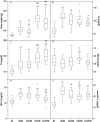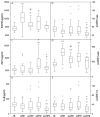The effects of long-term moderate exercise and Western-type diet on oxidative/nitrosative stress, serum lipids and cytokines in female Sprague Dawley rats
- PMID: 34319428
- PMCID: PMC8783884
- DOI: 10.1007/s00394-021-02639-4
The effects of long-term moderate exercise and Western-type diet on oxidative/nitrosative stress, serum lipids and cytokines in female Sprague Dawley rats
Abstract
Purpose: Regular exercise reduces obesity and the risk of cardiovascular disease. However, health-promoting benefits of physical activity are commonly associated with increased inflammation and oxidative stress. Here, we tested whether constant moderate exercise is able to prevent or attenuate the oxidative/nitrosative stress, inflammation, and serum lipids in lean and obese rats.
Methods: Four-month-old female Sprague Dawley rats received standard or a high-fat diet. Animals were subjected to a physical activity protocol, consisting of 30 min forced treadmill exercise for 5 consecutive days per week during 10 months. Baseline and sedentary (non-exercised) rats were used as controls. Lipids, oxidized low-density lipoprotein cholesterol, nitric oxide metabolites, and pro- and anti-inflammatory markers were measured in blood collected upon euthanasia.
Results: At variance to young baseline control rats, 14-month-old animals fed normal diet had increased plasma lipid levels, including total cholesterol and triglycerides, which were further elevated in rats that consumed a high-fat diet. While treadmill exercise did not lower the amount of serum lipids in standard diet group, forced physical activity reduced non-high-density lipoprotein cholesterol in response to high-fat diet feeding. Exercised rats fed standard diet or high-fat diet had lower abundancy of nitric oxide metabolites, which coincided with increased levels of oxidized low-density lipoprotein cholesterol. Accordingly, the amount of nitric oxide metabolites correlated inversely with oxidized low-density lipoprotein cholesterol and homo-arginine. Exercise significantly reduced inflammatory cytokines in high-fat diet fed rats only.
Conclusion: Our study suggests that regular exercise alters the equilibrium between oxidative and anti-oxidative compounds and reduces pro-inflammatory cytokines.
Keywords: Long-term moderate exercise; Nitric oxide; Nitric oxide synthase; Oxidized LDL; Sprague Dawley rats; Western-type diet.
© 2021. The Author(s).
Conflict of interest statement
The authors declare that no conflict of interests influenced the work reported in this paper.
Figures






References
-
- Annex TWHR-S (2004) Deaths by cause, sex and mortality stratum in WHO regions, estimates for 2002, Annex Table 2. https://www.who.int/whr/2004/annex/topic/en/annex_2_en.pdf?ua=1. Accessed 15 Jan 2020
-
- Kaikkonen J, Porkkala-Sarataho E, Tuomainen TP, Nyyssönen K, Kosonen L, Ristonmaa U, Lakka HM, Salonen R, Korpela H, Salonen JT. Exhaustive exercise increases plasma/serum total oxidation resistance in moderately trained men and women, whereas their VLDL + LDL lipoprotein fraction is more susceptible to oxidation. Scand J Clin Lab Invest. 2002;62(8):599–607. doi: 10.1080/003655102764654330. - DOI - PubMed
MeSH terms
Substances
LinkOut - more resources
Full Text Sources

